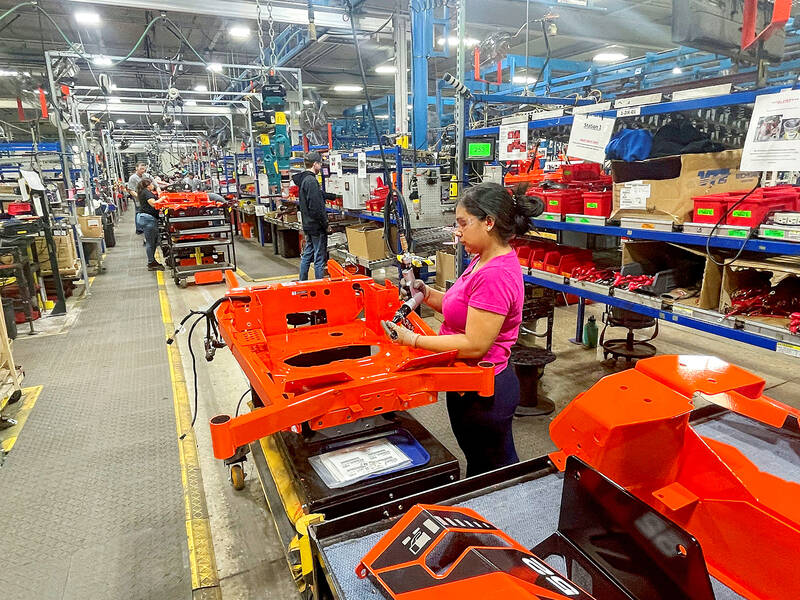US manufacturing activity shrank last month by the most in five months as lean order books prompted the steepest output contraction since 2020.
The Institute for Supply Management’s (ISM) factory gauge eased 0.3 point to 48.7, data out yesterday showed. The group’s production index stumbled more than 4 points to 44. Readings below 50 indicate contraction.
The figures illustrate an industrial sector struggling for traction as US tariffs and general uncertainty surrounding trade policy interrupt expansion plans.

Photo: Tim Aeppel, Reuters
Orders shrank for a third month and backlogs retreated at a faster pace, consistent with subdued demand. Prices paid for inputs, however, accelerated slightly.
Eleven industries expanded, led by apparel, petroleum, and plastics and rubber, while six contracted.
The report also showed the strategy of rushing in imports ahead of tariffs is drawing to a close. The ISM imports index declined at the fastest pace since the end of 2023.
In addition to the headwinds posed by sluggish demand, producers are also contending with higher costs. A measure of prices paid for materials increased to the highest level since June 2022 despite cheaper energy costs.
“Demand and production retreated and destaffing continued, as panelists’ companies responded to an unknown economic environment,” ISM Manufacturing Business Survey Committee chair Timothy Fiore said in a statement.
“Prices growth accelerated slightly due to tariffs, causing new order placement backlogs, supplier delivery slowdowns and manufacturing inventory growth.”
Weak orders, slower production and declining backlogs help explain a third straight month of decreasing manufacturing employment. Government data due to be released today are expected to show factory payrolls fell last month for the first time in three months.
Meanwhile, producers are keeping inventories lean. The ISM’s gauge fell to 50.8.

BYPASSING CHINA TARIFFS: In the first five months of this year, Foxconn sent US$4.4bn of iPhones to the US from India, compared with US$3.7bn in the whole of last year Nearly all the iPhones exported by Foxconn Technology Group (富士康科技集團) from India went to the US between March and last month, customs data showed, far above last year’s average of 50 percent and a clear sign of Apple Inc’s efforts to bypass high US tariffs imposed on China. The numbers, being reported by Reuters for the first time, show that Apple has realigned its India exports to almost exclusively serve the US market, when previously the devices were more widely distributed to nations including the Netherlands and the Czech Republic. During March to last month, Foxconn, known as Hon Hai Precision Industry

Taiwan Semiconductor Manufacturing Co (TSMC, 台積電) and the University of Tokyo (UTokyo) yesterday announced the launch of the TSMC-UTokyo Lab to promote advanced semiconductor research, education and talent development. The lab is TSMC’s first laboratory collaboration with a university outside Taiwan, the company said in a statement. The lab would leverage “the extensive knowledge, experience, and creativity” of both institutions, the company said. It is located in the Asano Section of UTokyo’s Hongo, Tokyo, campus and would be managed by UTokyo faculty, guided by directors from UTokyo and TSMC, the company said. TSMC began working with UTokyo in 2019, resulting in 21 research projects,

Ashton Hall’s morning routine involves dunking his head in iced Saratoga Spring Water. For the company that sells the bottled water — Hall’s brand of choice for drinking, brushing his teeth and submerging himself — that is fantastic news. “We’re so thankful to this incredible fitness influencer called Ashton Hall,” Saratoga owner Primo Brands Corp’s CEO Robbert Rietbroek said on an earnings call after Hall’s morning routine video went viral. “He really helped put our brand on the map.” Primo Brands, which was not affiliated with Hall when he made his video, is among the increasing number of companies benefiting from influencer

Taiwan’s property market is entering a freeze, with mortgage activity across the nation’s six largest cities plummeting in the first quarter, H&B Realty Co (住商不動產) said yesterday, citing mounting pressure on housing demand amid tighter lending rules and regulatory curbs. Mortgage applications in Taipei, New Taipei City, Taoyuan, Taichung, Tainan and Kaohsiung totaled 28,078 from January to March, a sharp 36.3 percent decline from 44,082 in the same period last year, the nation’s largest real-estate brokerage by franchise said, citing data from the Joint Credit Information Center (JCIC, 聯徵中心). “The simultaneous decline across all six cities reflects just how drastically the market